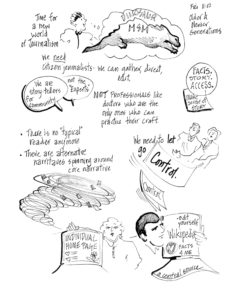CONVENOR: Chris Peck
PARRTICIPANT LIST: Chris Peck, Bill Krasean, Sarah Stuteville, Ken Sands, Matt Thompson, Duane Stoltzfus, Florangela Davila, Silja Talvi.
DISCUSSION
Chris Peck: So, what’s different about the journalism expectations and practices of those who have been in the business a long time, and the expectations and practices of those who are new to the business?
Matt Thompson – Well, for my generation (younger Gen Y) there is an expectation that we can get the news on our terms, where we want it when we want it, not just once a day from a newspaper or a broadcast TV site.
Sarah Stuteville – I don’t think the difference is that young people don’t care about the news and older people do. But I do think that young people think the old news, and old media, are dinosaurs. The newspaper seems old.
Ken Sands – And, I think young people sometimes read the newspaper and feel stupid. They haven’t been following things day-to-day, so they pick up the paper and start reading and can’t follow stuff. Online, they can go, find out the background, the context, and they can feel smart.
Duane Stoltzfus – I think some people are tired of the news driving people apart, instead of bringing people together. It’s very one –way. For a new generation of journalists, I think that there has to be more of an effort to make a connection with people.
Sarah Stuteville – I’m thinking of the recent series in The New York Times about Class in America. It’s got context. It is a series that helps me understand the big picture. I think my generation will read that.
Matt Thompson – The biggest frustration I have with the older generation of media is looking at the Web sites. They represent an utter failure of imagination. I think the digital media world give us an opportunity to offer a variety of perspectives, many points of entry to a story. But newspaper Web sites continue to just stories from the newspaper. There is no serendipity in newspaper Web sites, no way to make connections, link one idea with another.
Ken Sands – One of the mistakes that today’s journalists make is thinking that once a story appears in the paper that’s the end of it, that’s the end of the story. Online, we know that people come in waves to explore, to learn. They go back to read stories, find the whole pictures.
Chris Peck – And, we often keep telling the same incremental story, again and again. The War in Iraq becomes one story after another about how many soldiers or civilians were killed today. The eyes of our readers begin to glaze over, even though we need to be connecting the dots between the war, our reliance on oil, our politics, etc.
Ken Sands – People want something new every day. An example: in Spokane we ran a page one story on the Iraqi constitution last week and got 20 hits. On that same day we ran a story about local policemen who stopped a drunken 19-year-old girl as see was speeding at 90 miles an hour through a school zone. He didn’t ticket her because she agreed to have sex with him. That story got 50 times the readership. People already had heard about Iraq, they were more interested in something new.
Sarah Stuteville – I agree, there are stories that people don’t want to read because it just seems like the same old negative stuff day after day. Sometimes I think people of my generation just want the media to give the negativity a rest. I find myself going to worldchanging.com, which is all about people who are making a difference around the world. My generation wants to know about people who are doing amazing things, but there is not much in the mainstream media that tells about these things.
Matt Thompson – And, many young people get their news and politics from entertainment and culture. From music and movies they decide what they care about, that’s what the news is. When Green Day sings American Idiot, for many people that’s enough of politics – through arts and entertainment.
Chris Peck – I think what this suggests is that much news is now a commodity. Think of Harriett Meirs, the Supreme Court nominee. Two weeks ago, no one knew her. Today, everyone knows a little bit about her. So what becomes interesting are the different takes on here, from The Daily Show, or blogs, or other sources outside the mainstream media.
Matt Thompson – Young people are very savvy at getting the nut of information these days. We know the basics. What is interesting to us finding out how others are responding to the news, challenging the master narratives, going against the grain. These alternatives narratives can be funny, absurd, angry, off-the wall. But they need to be included in the future practices of journalism.
Ken Sands – For the next generation, the readers really are in control of content, and the traditional journalists don’t like it. They want to be the keepers of the news, control the flow of the news, and be the gatekeepers. And, when they see that begin to slip away they get scared. They don’t want to change.
Matt Thompson – The idea of a central journalistic authority playing to a common denominator is gone. An example: Wikipedia has replaced The New York Times as the newspaper of record in this country.
Chris Peck – So, we need to find a way to get more voices, more varied perspectives into the coverage of news and in the very definition of news.
